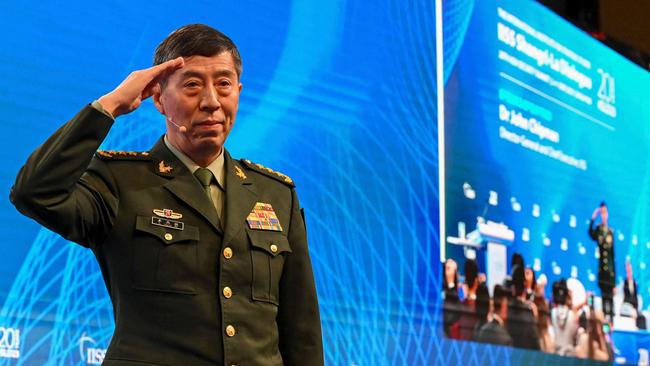China‘s Defence Minister say ‘mind your own business’ on South China Sea, Taiwan
After addressing Beijing’s approach to Taiwan, China’s Defence Minister took a swipe at Australia’s AUKUS deal in a major security address.

China’s Defence Minister has told a concerned world to “mind your own business” in a major address explaining Xi Jinping’s “Chinese wisdom” on international security relations.
Minister Li Shangfu — a general and since March the international face of the People’s Liberation Army — told a security conference in Singapore on Sunday that China has “one of the best peace records” among major countries.
But what had been a sunny address explaining President Xi’s signature Global Security Initiative, took a dark turn when the Chinese defence chief discussed Beijing’s approach to Taiwan, a subject of heightened international anxiety.
“When friends visit us, we welcome them with fine wine. When jackals or wolves come, we will face them with shotguns,” Minister Li said, quoting a popular Chinese song.
The Chinese Defence minister said Beijing’s preference was “peaceful unification” with Taiwan, a self-ruled liberal democracy, but he added that China would never “promise to renounce the use of force.”
A questions and answer session after his keynote address at the Shangri-La Dialogue, which Prime Minister Anthony Albanese addressed on Friday, revealed widespread concern about China’s aggressive behaviour in the South China Sea and intentions towards Taiwan.
Delegates from the Philippines, Vietnam, the Netherlands, the United States and Germany asked about the “apparent disconnect between China’s words and actions” in the region.
In his response, Minister Li said that China had signed “codes” with many countries on how its military would operate. But then he seemed to suggest these did not apply in international waters and airspace near China.
“Why did all those incidents happen in areas near China?” Minister Li asked. “For China, we always say: mind your own business.”
US Defence Secretary Lloyd Austin on Saturday outlined American-led efforts to deter Chinese military action in the region, including AUKUS, the Quad and increased American troop rotations in Australia and Japan.
President Joe Biden’s top Defence official called for Beijing to work with Washington to establish “guardrails” to avoid conflict, echoing a point made by Prime Minister Albanese.
“For responsible defence leaders, the right time to talk is anytime,” Secretary Austin said in his keynote address at Shangri-La.
“The right time to talk is now. Dialogue is not a reward — it is a necessity.”
China declined American efforts to arrange a meeting between the two countries’ defence chiefs at the three-day Singapore meeting.
Secretary Austin also rebuffed alarmist recent assessments by senior US military officials that suggested Beijing was preparing for an imminent attack on Taiwan.
“I’d also highlight that conflict is neither imminent or inevitable. Deterrence is strong today — and it’s our job to keep it that way,” Mr Austin said.
Chinese delegates at the Singapore conference told The Australian that passage had been well received and said Beijing has no sense of urgency about Taiwan.
In a sign that the US-China relationship may be slightly stabilising after the balloon-gate drama, Washington said over the weekend that US Assistant Secretary of State for East Asian and Pacific Affairs Daniel Kritenbrink will travel to China next week.
It comes after a report that CIA director Bill Burns — one of President Biden’s most trusted officials — made a clandestine visit to China last month, in an effort by the White House to calm the fractious relationship.
China’s Defence Minister on Sunday acknowledged the international concern about the state of the relationship.
“It is undeniable that a severe conflict or confrontation between China and the US will be an unbearable disaster for the world.”
He said China was willing to work with countries in the region to create “hotlines” to avoid military escalations.
“China is ready to work with all other parties to build stronger security and confidence building systems.”
The Chinese defence chief said China was “committed to upholding peace in handling international crises”, before taking a swipe at the US and its AUKUS security partnership with Australia and the UK.
“Meanwhile, some country is expanding military bases, reinforcing military presence and intensifying arms race in the region and transferring nuclear weapon technologies to a non-nuclear state,” he said.



